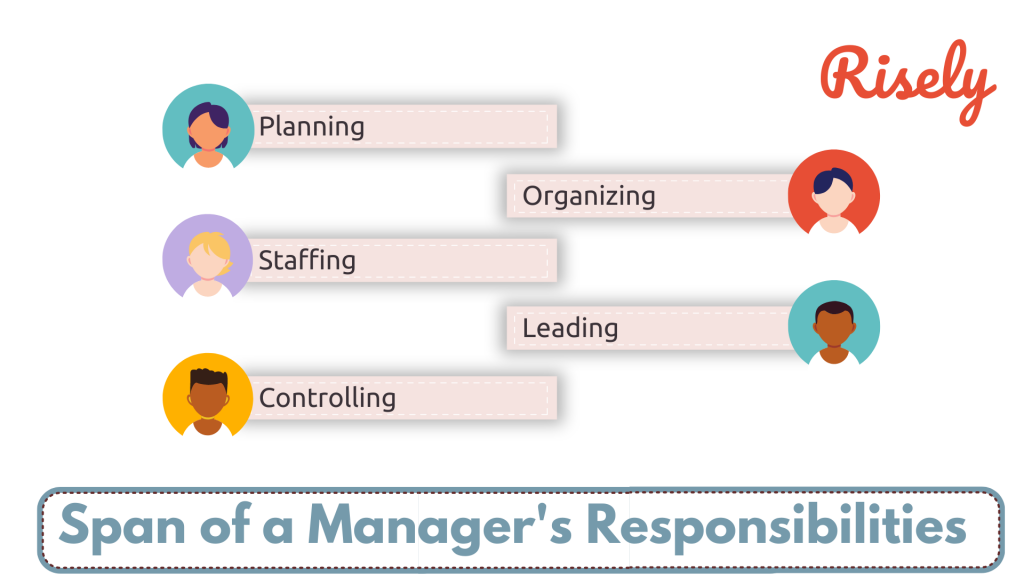What are the Responsibilities of a Manager? 7 Secrets to Success
What makes a manager successful? Does this question even pop into your head often? Yes? So, being a manager and evaluating yourself as a manager can be one of the most challenging tasks; obviously, managing a team still ranks first. However, assessing your success as a manager is necessary to find scope to learn and grow. the success of your roleBut, What are your responsibilities as a manager? Managers are like the ship’s captains, responsible for their teams’ smooth sailing and functioning. You are responsible for leading, planning, and ensuring that every team member knows their role. Being a manager is all about guiding your team to success and development. So, before we get deep into the seven key responsibilities of a manager that can make them shine, let’s first understand the manager’s role and authority.
Defining the Role of A Manager
As a manager, you are responsible for the organization, coordination, and direction of work. You are responsible for establishing and maintaining relationships with the organization’s employees to get the best out of them. A crucial role of a manager is to create profit, improve efficiency, and establish a safe environment. Your part is to either promote or remove ideas that may potentially work. You must have met many managers in your professional journey. Have you heard them say this task is not my responsibility? No, right? Because a manager’s job is not limited to a typical job description. Meet Andrew, a manager in a bustling office. One day, the company remodels the workspace, introducing a more open layout. As a manager, it is Andrew’s responsibility to understand how his team reacts to this change—some might thrive in the collaborative space, while others might need a bit more privacy. In this scenario, Andrew’s job becomes like a puzzle. She learns about her team’s preferences, figuring out the right balance for everyone. For instance, she discovers that some employees prefer being closer for quick collaboration, while others need more space to focus. So, being a manager isn’t just about giving orders—it’s about understanding the unique needs of each team member, adapting to changes, and creating a workspace where everyone can shine.
What is the Authority of a Manager?
Let’s discuss why a manager’s authority is a big deal in business—it’s their secret weapon for success. Your authority isn’t just about giving orders; it’s your power to steer the ship, make decisions, and lead your team to victory. Think of it as the captain’s hat on your head, guiding everyone towards a common goal. Now, where does this power come from? It’s like collecting badges in a video game—your experience, knowledge, where you stand in the company, and how well you communicate are your badges. The more badges you have, the stronger your authority. Picture this: a manager with high authority is like a team’s MVP. They can effectively lead, inspire, and get everyone on board. It’s not just about managing; it’s about becoming a key player in the company’s success. But here’s the kicker: with authority comes the ability to set the rules. You’re like the referee, ensuring everyone plays by the same rules. It’s about creating a fair game for everyone. Now, how much power you have depends on your role, your relationship with the team, and the situation. Sometimes, you need to correct things—like a mechanic fixing a glitch in the system. Other times, you’re directing the team towards a common goal, like reaching a milestone. Remember, how you use your authority is crucial. It’s not just about having the power; it’s about using it wisely. Whether it’s steering the ship through stormy seas or guiding your team to success, managers, your authority is your compass.What are the Responsibilities of a Manager?
A manager is a critical part of any team, and you have several key responsibilities that you must uphold to be successful. The key responsibilities of a manager include:Hiring the right people for the team according to skill and behavior gaps
According to McKinsey and Company’s article on attracting and retaining the right talent, 82% of companies don’t believe they hire the right talent. Isn’t it shocking for you? Hiring the right people for the team is one of the most important aspects of being a manager. The success of a company largely depends on the team you build. The right team can take the company to new heights, while the wrong team can lead to its downfall. As a manager, you must hire the right people for your team. You need to find individuals who have the skills and personality to fit into the company culture and who are motivated to do their best work. It can be difficult to determine whether or not a candidate is a good fit for your team. You need to ask the right questions to get a sense of their skills, attitude, and motivation. You also need to be aware of your company’s culture and what you are looking for in a candidate. The most important quality to look for in the new employees is their fit for the company’s culture. The employees should be a good cultural fit and should share the same values as the company. Read more: A Manager’s Guide to Hiring a Team: 9 Effective TipsLeading and motivating the team
As a manager, it’s important to be able to motivate your team. You want them to feel enthusiastic and excited about their work, and to be productive and efficient. You can do this by creating a positive work environment, being a role model for them, appropriate delegation, and providing clear instructions and goals. It’s also important for a manager to play a leadership role. This means being able to make decisions, take charge when needed, and handle difficult situations. Leaders can inspire their teams and get the best out of them on their career path. They also tend to have a clear vision for the future and know how to communicate this effectively to their team. Read more: 10 Ways to be a Better Leader: Tips on Effective Leadership Skills for Managers and SupervisorsSetting and communicating the team’s objectives and goals.
In leading and motivating the team, a manager’s pivotal role is setting and communicating team objectives and goals. Just like the captain charts the crew’s course, you ensure everyone is on the same page, moving in sync toward a common goal. It’s more than just choosing a goal setting frameworks; it’s about aligning individual aspirations with the team’s mission. As a leader, your responsibility is to clearly understand the objectives and goals. Picture it as setting coordinates for a journey—clear, concise, and detailed. Realism is key; goals need to be achievable and inspiring. Connecting individual goals with the team’s overarching vision completes the puzzle. This not only keeps everyone accountable but also fuels motivation. So, from leading the charge to setting the roadmap, a manager’s knack for goal-setting becomes the catalyst for a motivated and successful team.Setting individual objectives/goals and aligning them with the team’s goals
The first step is to set individual objectives for each team member. These should be specific, measurable, achievable, relevant, and time-bound (SMART). Once these objectives are set, the manager needs to make sure they are aligned with the team’s goals as well as the company goals. This can be done by revisiting the team’s goals regularly and making sure everyone is still on track. This ensures that everyone is working together towards a common goal and helps to avoid any conflict. When everyone is rowing in the same direction, it’s much easier to achieve success.Other Interesting Reads
Planning and organizing workflows
One of the most important responsibilities for you as a manager is the ability to plan and organize workflows. Workflows are how you delegate the tasks and the processes that your team follows to get the work done. By creating and organizing workflows, you can ensure that your team is productive and efficient. When work is flowing smoothly, employees can accomplish their goals with minimal disruption and managers can focus on higher-level tasks. However, when work is disorganized and chaotic, it can lead to frustration and decreased productivity which can make the completion of goals too hard. There is a small process that managers can follow here i.e;- First, make sure that your workflows are simple and easy to follow.
- Second, make sure that everyone on your team understands the workflows.
- Finally, be prepared to modify your workflows as needed.
Monitoring progress and ensuring goals are met
One of the biggest responsibilities of a manager is to make sure that the company is on track to meet its goals. It is one of the most essential skills of a manager to monitor the progress and day-to-day operations of their team and individuals within it to ensure that everyone is on track and meeting the goals of the organization. This can be done through various means such as employee performance reviews, goal setting, and tracking employee engagement. Regular performance reviews allow a manager to assess how an employee is meeting the goals set for them and to provide feedback on their progress.Developing and coaching team members
To be successful in a management position, you need to be able to develop and coach team members. This means having a clear understanding of what coaching is, and how it can benefit both the individual and the team. Coaching is a process that helps people learn and grow, and it can be used to improve the performance, productivity, and creativity of the team. There are many different techniques that you can use to coach their team members. The most important thing is to be respectful, positive, adaptable, supportive, and show empathy. Be patient, and allow team members to make mistakes. Offer feedback that is specific and actionable, and focus on the skills that will be most beneficial to the team.Making sure the team’s employee experience remains high and employee turnover remains low
Employee experience is one of the most important, but often overlooked, aspects of a manager’s role. Happy employees lead to low turnover rates and high employee experience scores. Conversely, unhappy employees lead to high turnover rates and low employee experience scores. Employee turnover here is very expensive. Replacing an employee can cost up to twice that employee’s annual salary. That’s why managers need to focus on creating a great employee experience. A great employee experience starts with making sure that the team is set up for success. That means giving them the tools and resources they need to do their jobs, providing clear and consistent communication, and offering opportunities for growth and development. It’s also important to create a positive work culture. This includes having a positive attitude towards employees, celebrating their successes, and providing social and bonding opportunities. You should also be aware of the factors that contribute to low employee experience scores, such as a lack of communication, unclear expectations, and a negative work culture.
Types of Managers and their Responsibilities
There are many different kinds of managers with different roles, and so are their responsibilities. Every manager is unique; let’s understand the various responsibilities of a manager.- General Manager: They oversee the entire business. Their responsibilities include setting and achieving strategic goals, managing resources, and ensuring overall success.
- Project Manager: These managers are responsible for planning, executing, and closing specific projects. They coordinate team efforts, manage budgets, and ensure that projects are completed on time and within scope.
- Team Manager: They are in charge of leading team members working on related tasks. Their responsibilities include assigning work, providing guidance, and meeting team goals.
- Operations Manager: Operations managers are responsible for the day-to-day operations of a department or organization. They focus on efficiency, quality, and process improvement.
- Sales Manager: Sales managers lead sales teams, setting sales targets, developing strategies, and coaching sales representatives to meet revenue goals.
- Marketing Manager: Marketing managers are responsible for promoting products or services. They develop marketing strategies, manage campaigns, and analyze results to achieve marketing objectives.
How to Ace the Roles and Responsibilities of a Manager?
The roles and responsibilities of a manager are varied and vast. The game can get confusing whether you are new to the arena or an old sport. Here’s a breakdown of the seven secrets of effective managers that will help you give your best at every single of the responsibilities of a manager:Build a Vision
To become a successful manager, you need a clear and compelling vision for the team or organization. This vision is a guiding light and motivates the team to achieve a common goal. A well-defined vision provides direction, purpose, and a sense of belonging to the team members, leading to increased engagement and productivity. A vision is the root of setting expectations at work. It helps you prioritize your team’s needs accurately to lead them forward. Effective managers communicate the vision consistently and ensure everyone understands and aligns their efforts.Plan and Execute
Want to become a great manager? Two most important skills to master strategic planning and tactical execution. Once you master the art of goal setting as individuals and leaders. Furthermore, you should hone your strategic thinking skills to prepare their teams for the road ahead. Planning involves breaking down the vision into actionable steps and allocating resources effectively. On the other hand, execution involves leading the team to work efficiently, overcoming challenges, and making necessary adjustments to stay on track. Treading the subtle line between micromanagement and management is the key here.Manage Your Time and Goals
Time management is crucial for you as a manager as you juggle multiple responsibilities and priorities. You must be able to prioritize tasks, delegate when appropriate, and focus on activities that contribute most to achieving goals. Time management also involves striking a balance between short-term demands and long-term objectives. Successful managers continuously evaluate progress, learn from their experiences, and refine their time management processes.Communicate Effectively
Effective communication is a fundamental skill for managers. You must articulate the vision, provide clear instructions, offer constructive feedback, and actively listen to their team members. Transparent and open communication fosters trust and collaboration, reduces misunderstandings, and creates a positive work environment. But that’s not the only facet. In some instances, they need to master assertive communication as leaders or become the champions of persuasion in others. A manager’s communication style requires adaptability to individual team members and encourage open dialogue.Connect with Your Team
Building solid relationships with team members is essential for managerial success. Managers should invest time understanding their team members’ strengths, weaknesses, and aspirations. They should provide support and guidance while empowering employees to take ownership of their work through constructive feedback. Regular one-on-one meetings and active listening are a couple of steps in this direction. Conflict management skills come in handy, too, as building a positive and inclusive team culture boosts morale and fosters loyalty, resulting in increased productivity and reduced turnover.Jump Over Hurdles
Challenges and obstacles are inevitable in any management role. Successful managers are resilient and adaptable. They approach challenges with a problem-solving mindset, seeking creative solutions and learning from mistakes. Critical thinking and sharp decision-making skills are the secrets of managers who rise above failures repeatedly. They are proactive in addressing issues and are not afraid to seek support from their teams or superiors when needed – whether they have to adopt the route of confrontation or collaboration.Do Not Stagnate
The business landscape is constantly evolving, and successful managers need to keep pace with changes in their industry and leadership practices. Continuous learning, personal development, and staying abreast of industry trends are vital for maintaining effectiveness as a manager. Embracing new technologies, encouraging innovation, and fostering a learning culture within the team are ways to prevent stagnation and remain competitive. In summary, mastering these key areas enables managers to lead their teams effectively, achieve their goals, and drive long-term success for their organizations. It requires a combination of leadership skills, emotional intelligence, adaptability, and a commitment to continuous improvement. Now that you know the secret of successful managers try to follow them to excel. Read more: Becoming The Best Manager: Why AI Co-Pilot Overtakes Manual Solutions?Conclusion
By now, you must have understood the manager’s role is to guide team members to reach their maximum potential. As a manager, you are responsible for motivating and leading your team members. Whereas the responsibilities of the manager have no boundaries. We hope the above explanation helps you understand the manager’s authority and the duties every manager should fulfill.Are you prepared to ace the managerial role?
Find out now with Risely’s set of free leadership skill assessments for managers and leaders.
Responsibilities of a Manager FAQs
What are responsibilities of a manager?
Managers are accountable for leading teams, setting goals, planning, organizing, and coordinating resources to achieve objectives. They are responsible for decision-making, problem-solving, performance management, employee development, and ensuring adherence to company policies and values.
What are duties of a manager?
A manager’s duties include delegating tasks, providing direction, monitoring progress, resolving conflicts, communicating with stakeholders, and reporting to higher management. They must create a positive work environment, promote teamwork, and achieve organizational goals efficiently.
What are the skills of manager?
Successful managers possess strong communication, leadership, problem-solving, decision-making, time management, and interpersonal skills. They excel in motivating and coaching their team, fostering innovation, and adapting to change.
How to be a successful manager?
To succeed, managers must prioritize effective communication, encourage employee engagement, lead by example, stay organized, continuously develop their skills, and seek feedback to improve their performance.
What is the characteristics of good manager?
Good managers are approachable, fair, and empathetic. They demonstrate integrity, accountability, and a positive attitude. They support their team’s growth, encourage collaboration, and recognize and celebrate their team’s achievements.
Other Related Blogs
Know the best sales manager 30 60 90 day plan to be an efficient leader
Know the best sales manager 30 60 90 day plan to be an efficient leader Are you a sales manager looking to make a strong impression on your new team…
Manager Effectiveness: A Complete Guide for Managers in 2024
Manager Effectiveness: A Complete Guide for Managers in 2024 Manager effectiveness is everyone’s favorite buzzword. But the road to achieving it is trickier than it looks like! While manager effectiveness…
5 Steps Training Needs Assessment Model: Why It Is Important For Employees?
5 Steps Training Needs Assessment Model: Why It Is Important For Employees? Have you ever wondered why some training programs hit the bullseye while others miss the mark? Well, it’s…
5 Steps of Developing an Effective Training Evaluation Program: With Best Practices
5 Steps of Developing an Effective Training Evaluation Program: With Best Practices Have you ever wondered how effective those training initiatives truly are? How do you know if they’re making…


